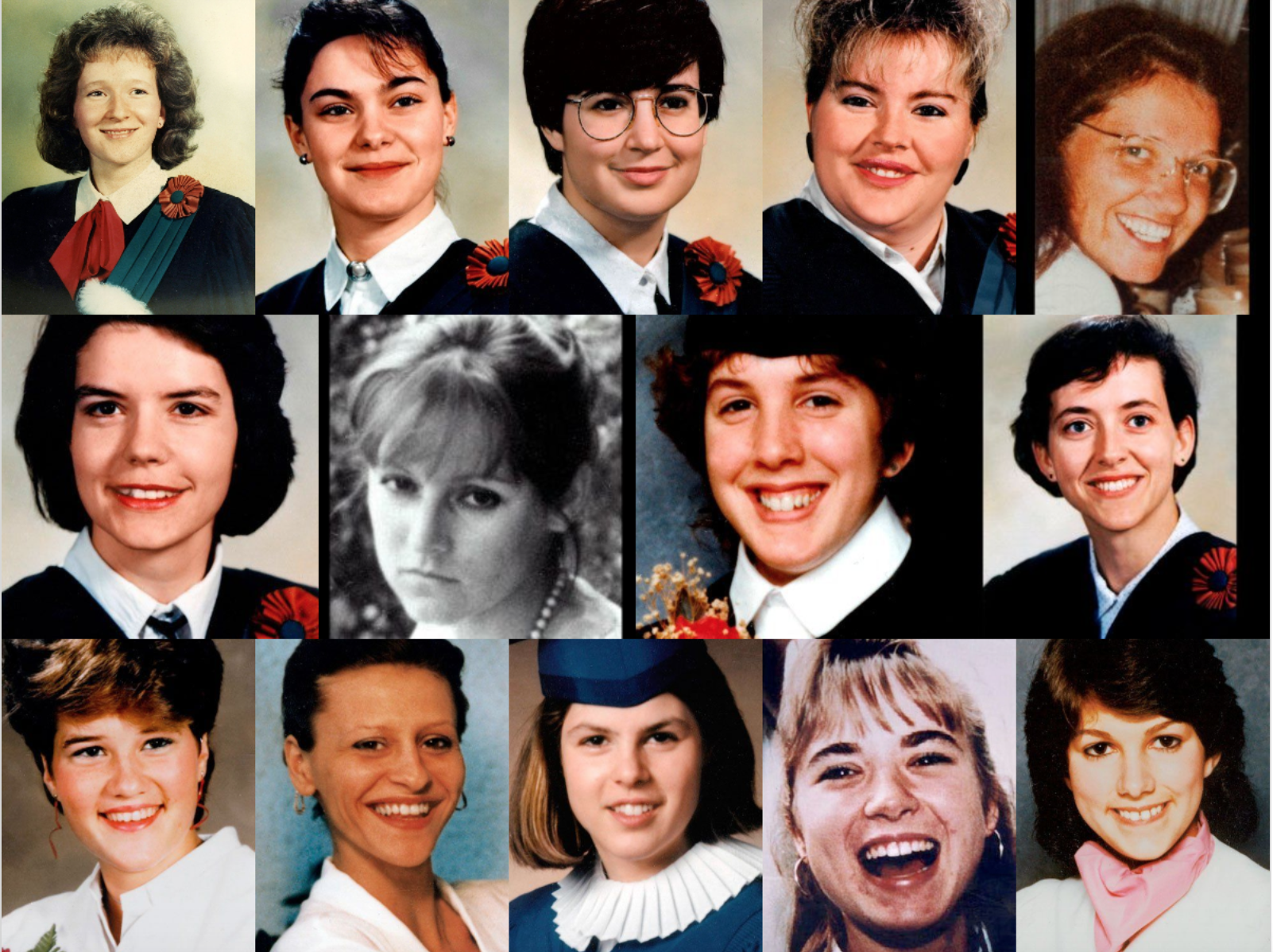
At the end of today’s memorial ceremony honouring the 14 women killed at Montreal’s École Polytechnique on December 6, 1989, a group of female McGill engineering students formed a tight circle, arms around each other’s shoulders. Moments earlier, they had each placed a single rose on memorial plaque for the women who had lost their lives.
Although not a part of the official proceedings, it was a fitting finale to an emotional memorial commemorating the 34th anniversary of one of Montreal’s darkest moments.
“Each year, the McGill community unites to pay tribute to the victims of the 1989 attack at École Polytechnique, which violently ended the lives of 14 young women, and shattered the lives of so many people, whether through physical or psychological injury, or through the loss of a loved one,” said Angela Campbell, Associate Provost (Equity and Academic Policies), to begin the event.
“As a community, we gather to remember these women because, as stated in the resolution that was passed by the McGill Senate following the tragic events, ‘this violence cannot be forgotten, by this generation, or any other.’”
Approximately one hundred members of the community gathered in front of the memorial plaque and tree across from the University Centre on McTavish Street. On top of McGill students, staff, and faculty, Greg Kelley, MNA for Jacques-Cartier, also took part in the event.
Toward a more just society
Principal Deep Saini reminded the crowd of the disturbing prevalence of gender-based violence in Canada.
“According to the Canadian Women’s Foundation, 184 women and girls in Canada lost their lives to gender-based violence last year – that’s roughly one woman or girl killed every 48 hours,” he said.
“We have a long way to go. This is one area, sadly, in which I don’t see the progress…,” said an emotional Saini. “As a male member of our society that makes me sad and guilty.”
The Principal urged people to reflect upon the lives lost at Polytechnique and “to advance women’s equality, to condemn gender-based violence in all forms, and to eradicate structural and individual violence against girls and women everywhere.”
“We each have a vital role to play, both as members of McGill’s campus community and as citizens seeking to build a more just, more equitable, and violence-free society, for all our members,” said Saini.
Heartfelt tributes
The most emotional part of the ceremony saw 14 female engineering students read tributes to each of the 14 women of École Polytechnique. The students are all members of POWE (Promoting Opportunities for Women in Engineering), a philanthropic, student-run club dedicated to creating an open community to support self-identifying female engineers.
One by one, the McGill students addressed the crowd before laying a single white rose at the memorial plaque. Several cried openly. The tributes offered brief but poignant glimpses into 14 lives brimming with potential but cut so tragically short.
- Geneviève Bergeron: “She was a civil engineering student who had just turned 21. She played the clarinet, she sang in the Montreal Symphony Orchestra, and she had even babysat Montreal mayor Jean Doré’s youngest child.”
- Hélène Colgan: “She was at the end of her degree in mechanical engineering. She was 23 years old when she died. She was a strong student who was looking forward to what came after her degree. In fact, she had three job offers lined up.”
- Nathalie Croteau: “She was friends with Hélène Colgan, both of whom were planning to vacation someplace warm after their exams. She was three months from graduating and she was only 23 years old.”
- Barbara Daigneault: “Her father was a mechanical engineering professor and she worked alongside him as a teaching assistant during her degree. She would share her notes with other students, always trying to help. She liked chocolate cake with whipped cream. She was 22 years old.”
- Anne-Marie Edward: “She was 21 years old. She was studying chemical engineering. She loved rock climbing, downhill skiing and whitewater rafting.”
- Maud Haviernick: “She was studying materials engineering and she already had a bachelor’s degree in environmental design. She made community living habitats. It was her dream to pursue a career in engineering and design. She made sculptures as a hobby. She was 29 years old.”
- Barbara Klucznik-Widajewicz: “She was studying engineering, logistics and economics. She loved to read. She spoke five languages. She was studying nursing and was 31.”
- Maryse Laganière: “She was a budget clerk for the department of finance. She had 13 older siblings. She tried to stop the gunman and not let him into the school. She was 25 years old.”
- Maryse Leclair: “She was 23 years old and the oldest of four sisters. She was studying in her fourth year of mechanical engineering. She was in love with a classmate named Benoit. She loved listening to music.”
- Anne-Marie Lemay: “She was a mechanical engineering student who was inspired to study mechanical devices because her friend had lost a leg and she was fascinated by the importance of mechanical devices in his rehabilitation. She was 22 years old. She played in a band.”
- Sonia Pelletier: “She loved rock music. Her favourite song was ‘Still Alive.’ She was days away from graduating at 28 years old in mechanical engineering.”
- Michèle Richard: “Her nickname was Mimi. She was in her second year of materials engineering. She was 21 years old. She was hoping to buy a place and live in Lac-Mégantic where she was from.”
- Annie St-Arneault: “She was an only child. She was attending her last mechanical engineering class before graduating. She wrote poetry. She liked to work with her hands, and was passionate about the environment. She was 23 years old.”
- Annie Turcotte: “She had won a Women in Science bursary while attending Polytechnique. She was studying metallurgical engineering. She taught swimming lessons for free at a summer camp for children with disabilities. She was a protector of nature and the environment. She was 20 years old.”
When the last rose was laid, Campbell asked the crowd to observe a minute of silence.
Embarking upon the same path
Viviane Yargeau was the final speaker. It was a particularly moving moment as Yargeau is McGill’s first female Dean of the Faculty of Engineering.
Approaching the microphone, she thanked the 14 McGill students for their courage, before taking a step back to collect herself.
“We have just heard the names of the 14 women whose lives were cut short in a violent act of misogyny,” she said. “Let us take the time to reflect on each of these women – women who were working towards a future in engineering and nursing, women who had hopes and bright futures.”
Yargeau talked about the far-reaching impact of the tragedy, throughout Quebec, Canada, and the world. But it also hit people on a deeply personal level. “It impacted me personally as I was about to apply to engineering,” she said. “I felt personally connected because their path was the one I was about to take.
“We’ve made progress, but there’s more to be done,” Yargeau said. “What has changed is the ways in which we acknowledge, speak about, and treat violence against women. It’s the first step in the right direction.
“We can only continue to move forward if we keep the memory of these women alive, if we pay attention to the ways in which women continue to experience violence, and if we take action as institutions, as policy makers, as leaders, and as community members to support and protect all who face gender-based oppression.”


A meaningful Memorial. So, So well done. Lest we forget!
A sad day it was and it will remain so for many years. i was in my first year when this happened and as I was trying to comprehend with the tragedy that happened. I also had my family in Africa worried about me. MTSRIP